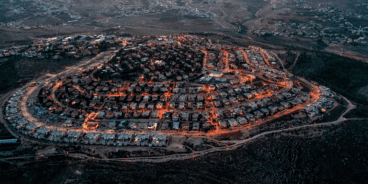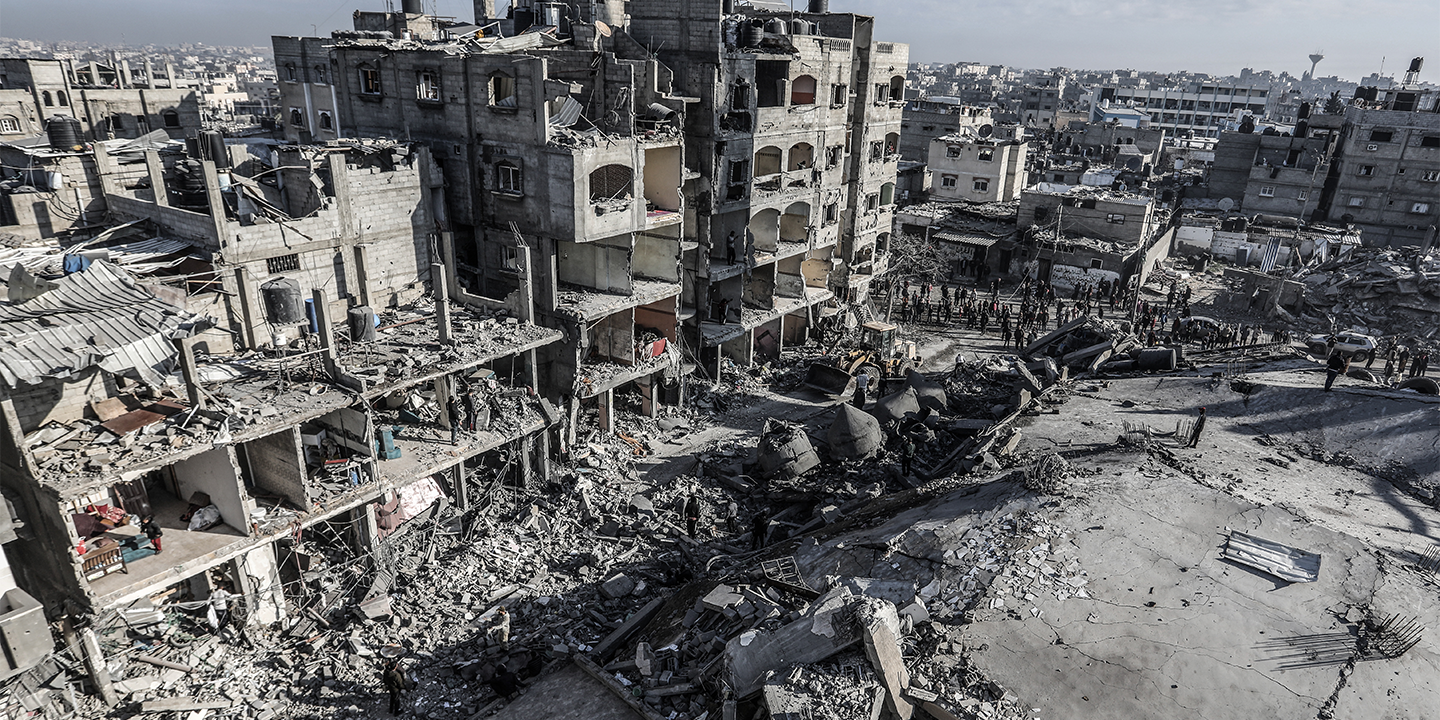

Atrocity Alert No. 388: Israel and the Occupied Palestinian Territory, South Sudan and Nicaragua
Atrocity Alert is a weekly publication by the Global Centre for the Responsibility to Protect highlighting situations where populations are at risk of, or are enduring, mass atrocity crimes.
UN EXPERT OUTLINES EVIDENCE OF GENOCIDE AGAINST PALESTINIANS IN GAZA
There are reasonable grounds to believe that acts of genocide are being perpetrated against Palestinians in Gaza, according to the latest report of the UN Special Rapporteur on the situation of human rights in the Palestinian territories occupied since 1967. Entitled “Anatomy of a Genocide,” the report concludes that since 7 October 2023 Israel has committed at least three of the constitutive acts of genocide in Gaza, as codified in Article II of the Genocide Convention: “killing members of the group;” “causing serious bodily or mental harm to members of the group;” and “deliberately inflicting on the group conditions of life calculated to bring about its physical destruction in whole or in part.”
The Special Rapporteur’s report outlines evidence for each of these constitutive acts of genocide, including the over 30,000 Palestinians killed in Gaza and the destructive nature of weapons and bombs used; the relentless physical and psychological harm inflicted on Palestinians, particularly children because of Israel’s means and methods of warfare; and the destruction of most of the life-sustaining infrastructure in Gaza, ongoing impossible evacuation orders and siege tactics. These tactics have created a humanitarian catastrophe, including deaths by starvation and dehydration. Additionally, the report finds that statements made by high-level Israeli military and government officials are evidence of genocidal intent, and these statements have been internalized and acted upon by Israeli forces.
The findings of the report align with South Africa’s application before the International Court of Justice (ICJ) instituting proceedings concerning alleged violations of Israel’s obligations under the Genocide Convention. On 26 January the ICJ issued legally binding provisional measures which ordered Israel to take all possible steps to prevent the commission of acts within Article II of the Genocide Convention.
Meanwhile, on 25 March the UN Security Council (UNSC) passed Resolution 2728 demanding an immediate ceasefire in Gaza for the month of Ramadan leading to a lasting sustainable ceasefire, as well as the unconditional release of all hostages. The resolution passed with 14 votes in favor and an abstention by the United States. This vote marked the ninth time that the UNSC voted on a draft resolution on the crisis since 7 October, with only two prior resolutions being adopted and neither calling for a ceasefire. Contrary to recent statements, Resolution 2728 is binding under international law. Attempts to undermine its legally binding nature are contributing to a dangerous campaign of disinformation in attempts to shield Israel from obligations under international law and are damaging the legitimacy of UNSC resolutions and the Council as a whole.
Resolution 2728 must be urgently implemented by all parties the conflict. Given mounting allegations and evidence of likely genocide, states must immediately implement an arms embargo on Israel, as well as apply other economic and political measures necessary to ensure respect for international law and implementation of Resolution 2728 and the ICJ’s provisional measures order.
UN COMMISSION WARNS OF VIOLENCE AND HUMAN RIGHTS VIOLATIONS IN SOUTH SUDAN
As South Sudan prepares for its first-ever national elections to be held by December this year, significant concerns remain about the country’s human rights situation. On 1 March the UN Human Rights Council (HRC)-mandated Commission on Human Rights in South Sudan (CHRSS) presented its latest report, detailing a range of human rights violations, abuses and related crimes, including systematic political repression and economic predation by political elites. Yasmin Sooka, Chair of the CHRSS, said, “Our investigations again found an absolutely unacceptable situation in South Sudan, whereby families and communities are devastated by human rights violations and abuses by armed forces, militias and State institutions acting with impunity.”
The CHRSS reported that women continue to endure pervasive discrimination, inequality, sexual violence and sexual slavery. Children are also suffering egregious violations, arising from the ongoing insurgency and resurgent subnational violence, fueled by local and national elites. Throughout the transitional period, political leaders have continued to focus on preserving their own personal power, allowing mistrust to reinvigorate ethnic tensions and fuel violence across the country. Continuous political competition and the mobilization of armed groups is leading to increasing localized conflict and fragmentation and widening ethnic divisions.
The absence of key conditions for holding free, fair, secure and credible elections by December also creates numerous risks for populations in South Sudan. Among other concerns, security sector reform remains significantly behind schedule and a new permanent constitutional framework, voter registration details, an election security plan and a mechanism for resolving disputes over the elections results are not yet fully in place. The CHRSS said that “while elections can be moments of great societal opportunity, they also bring potential danger, as electoral grievances may trigger new violence, or compound existing conflicts, in an already fragile situation.”
Additionally, during October the CHRSS concluded that civic and political space has “virtually disappeared” amid systematic repression of the media, human rights defenders and civil society. Diminishing opportunities for civilians to participate in constitution-making, transitional justice, national elections and other essential democratic processes may give rise to grievances and increase the risk of atrocity crimes.
The mandate of the CHRSS remains vital, particularly ahead of the planned elections and in an environment marked by continued grave human rights violations, persistent violence and repression of civic space. Given its invaluable role in monitoring and reporting on atrocity crimes and grave human rights violations, the HRC must extend the mandate of the CHRSS in full. The transitional government of South Sudan should urgently implement key provisions of the Revitalized Agreement, including establishing transitional justice institutions, as well as opening civic space, and enable political processes to be meaningful and legitimate.
NICARAGUAN GOVERNMENT REPORTEDLY CONTINUES TO COMMIT CRIMES AGAINST HUMANITY
In the past year the Nicaraguan government has continued to commit possible crimes against humanity to crush real or perceived political dissent, according to the UN Human Rights Council-mandated Group of Human Rights Experts on Nicaragua (GHREN). The GHREN warned that the situation has continued to deteriorate since its last report in March 2023 as patterns of repression have expanded toward all segments of Nicaraguan society, including university students, members of the Catholic Church and Indigenous Peoples of African descent, among others. According to the experts, “as the Government has neared its goal of total destruction of critical voices in Nicaragua (…) there has been an exponential increase of patterns of violations focusing on incapacitating any kind of opposition in the long term.” Repression also expands beyond the country’s border, including through the deprivation of nationality and the prohibition of family reunifications.
The GHREN previously documented that President Daniel Ortega and his wife, Vice President Rosario Murillo, have overseen the commission of the crimes against humanity of murder, imprisonment and torture, including sexual violence, deportation and politically motivated persecution. The crisis has been facilitated, in part, by the deliberate dismantling of democratic institutions since President Ortega took office in 2007, including the instrumentalization of the country’s executive, judicial, legislative and electoral branches. In the absence of an independent national judicial system, domestic avenues to ensure redress for victims of state-led violence remain elusive.
The situation escalated in 2018, when the government responded to street protests against pension cuts with excessive use of force and the mobilization of pro-government armed elements. Since then, Nicaragua has rapidly descended into authoritarianism. Attacks against civic space have become a defining feature of the Ortega administration, including through the forced shutdowns of more than 3,000 civil society organizations and the prosecution of journalists on charges of hate crimes or terrorism, forcing most independent voices into exile or self-censorship. No independent human rights monitoring body, including the GHREN, can access the country.
While UN member states from across multiple regions have taken important steps to address ongoing atrocity crimes, including through the establishment of the GHREN and the imposition of targeted sanctions, the international community has so far failed to apply a coordinated, holistic and robust strategy. The analysis and recommendations issued by the GHREN must form the basis of any bilateral or multilateral economic, political or diplomatic engagement with Nicaragua. Governments should also make use of the GHREN’s findings in all security, financial and trade relations and policies to increase pressure on the Nicaraguan government to halt its pervasive persecution.
Related Content


Atrocity Alert No. 403: Israel and the Occupied Palestinian Territory, Sudan and the UN Human Rights Council
